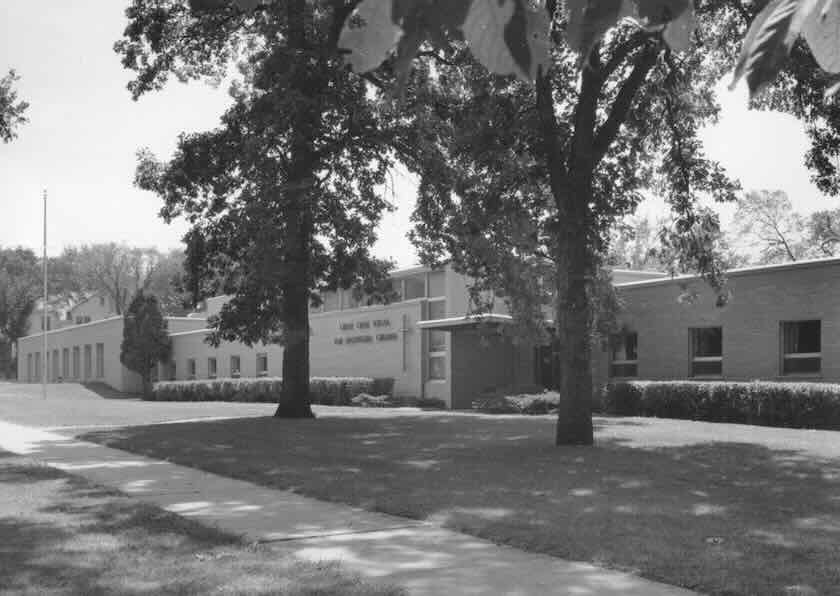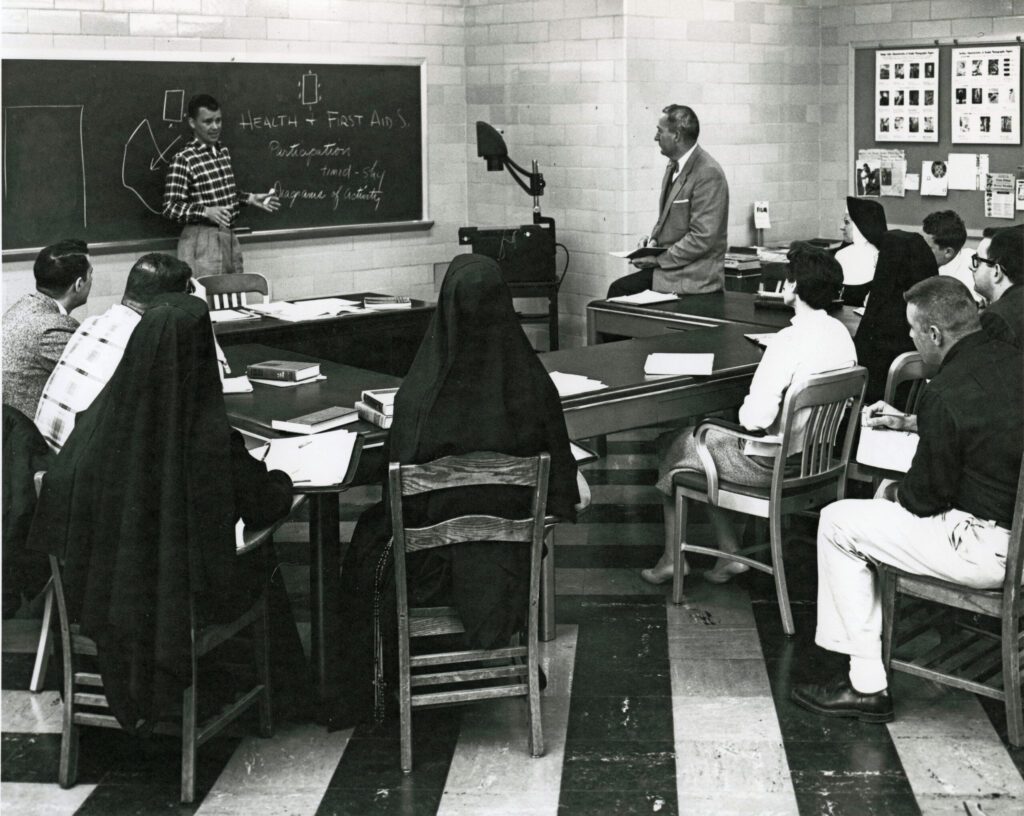When the Aquin student newspaper published the headline “Master of Education Degree Planned” on March 24, 1950, few could have imagined how transformative that moment would be. The opening of the first graduate program at the College of St. Thomas marked the beginning of a legacy that 75 years later has evolved into a diverse array of programs preparing educators and leaders across many fields.

The foundation of the graduate programs in education was the undergraduate teacher education program, which began in 1921. Under the leadership of Timothy O’Keefe, the program saw steady growth and led to St. Thomas’ reputation for excellence in teacher preparation for secondary school math and science instructors. After World War II, as demand increased the need for teachers with advanced credentials, O’Keefe helped design the college’s first master’s program, which still thrives today in the School of Education.
In the summer of 1950, about 30 men and women enrolled in the inaugural Master of Education classes. It was one of St. Thomas’ earliest coeducational offerings. Because most students were employed in area schools, courses were offered in the evening, on weekends, and during the summer. Just one year later, in June 1951, the first three students (Ted Molitor, Roy Warter and Ralph Winter) graduated with St. Thomas’ first Master of Arts degrees.

The new program quickly gained popularity among Twin Cities teachers, including many women in religious orders who taught in the archdiocese’s Catholic schools. In February 1952, Sister Mary Leonilla Wolfe, SSND, became the first woman ever to earn a Master of Education degree from St. Thomas. Five years later, in August 1957, Sister Maria Stephen Lamm, SSND, became the first person to receive St. Thomas’s Master of Secondary School Administration.
Under the leadership of Dr. James Byrne in the 1960s, Graduate Studies in Education continued to expand its offerings. By 1961, St. Thomas offered master’s degrees in Guidance and Counseling and in Developmental and Remedial Reading. In 1969, the program received approval to offer Educational Specialist (EdS) degrees in administration and counseling.

Dr. Robert Brown, who worked as an education professor and director of graduate programs in the School of Administration for over 50 years, once noted that during this period of programmatic growth St Thomas became known as “the place for teachers and school administrators to continue their education and receive master’s degrees.”
Enrollment soared to more than 700 students by 1979, prompting the program’s move from Aquinas Hall into Christ Child Hall.
Two decades later, as the School of Education prepared its move to Opus Hall on the Minneapolis campus, enrollment grew to 1,175 students.

The growth of St. Thomas’s graduate education programs can be attributed to the innovation and responsiveness of its faculty and leadership, who looked to meet the evolving needs of educational professionals. In 1974, the Educational Outreach Program was launched to extend the department’s reach beyond the St. Thomas campus. What began as coordinating continuing education workshops evolved into offering graduate courses “on site” in communities across Minnesota, throughout the United States, and even internationally, enabling educators to earn St. Thomas degrees close to where they lived and worked.

Throughout the decades, the School of Education has worked to develop alternative pathways to teaching. The Master of Arts in Teaching (MAT), introduced in 1961, offered a route to licensure for individuals who held a subject-area background suitable for secondary schools but with no formal education coursework. Starting in 1964, St. Thomas partnered with the Archdiocese of Saint Paul and Minneapolis to provide scholarships through the Murray Institute for Catholic school teachers pursuing licensure or advanced degrees. And in 1990, the Collaborative Urban Educator (CUE) program launched to support pathways to teacher licensure for individuals from underrepresented populations in Minnesota.

The launch of the Doctor of Education in Educational Leadership (EdD) in the summer of 1987 represented new heights for the School of Education. Designed to foster leadership not only within schools but also in business, health education, public service, and public safety, the program reflected St. Thomas’s vision of education as a force that shapes every sector of society.
Into the new millennium, the School of Education continued to expand its reach. In May 2021, the Minnesota Institute for Trauma-Informed Education (MITIE) was founded to develop, support and advance the field of trauma-informed and trauma-engaged education. Groundbreaking ‘Grow Your Own’ programs, such as residencies and work and learn, were introduced to provide affordable, flexible pathways for prospective teachers from underrepresented backgrounds to become licensed classroom teachers.



Additionally, in January 2023, a Collaborative Learning School with Maxfield Elementary was established to partner with the School of Education in preparing teachers, developing and applying best practices for teaching and learning, and providing professional development opportunities to create exceptional, student-centered learning environments.
From its modest beginnings in 1950 to its wide-ranging programs today, the School of Education at St. Thomas has continually adapted to meet the needs of the educators and communities it serves.

